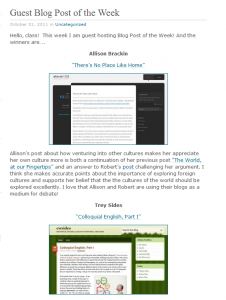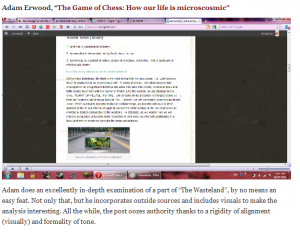 I had an “a-ha” moment in first-year composition class last week. I was preparing for a conference, writing job letters, preparing my classes, and trying to keep up with grading. In short, something had to give. But what? And then it hit me – Blog Post of the Week! Every week I go through all my students’ individual blogs (all 75 of them – 25 per class) and select one “Blog Post of the Week” from each section. I pull those three posts to the front page of the class blog (I use a “hub-and spoke” model for my class blogs – you can read more about how it works here and how I use my blog in the classroom here) and I write a few lines explaining what made those posts exemplary. “Blog Post of the Week” or “BPOTW” as we call it, gives me a chance to model to the students what makes a good blog post and what consitutes good writing. One of the main reasons I do this is that I simply don’t have time to grade each student’s blog every week, and this way we can have a conversation about communication issues related to content, argument, audience, style, and visual design. I also like to showcase the best blog posts as a way to inspire the students who are struggling to find topics to post on, or whose blog posts are just short pieces of texts with no links, images, or attention to visual design. As an added incentive, the winner of BPOTW gets 5 bonus participation points. Students are encouraged to nominate their classmates for the award, and they can nominate themselves if they feel they have a BPOTW-worthy post (which many of them do).
I had an “a-ha” moment in first-year composition class last week. I was preparing for a conference, writing job letters, preparing my classes, and trying to keep up with grading. In short, something had to give. But what? And then it hit me – Blog Post of the Week! Every week I go through all my students’ individual blogs (all 75 of them – 25 per class) and select one “Blog Post of the Week” from each section. I pull those three posts to the front page of the class blog (I use a “hub-and spoke” model for my class blogs – you can read more about how it works here and how I use my blog in the classroom here) and I write a few lines explaining what made those posts exemplary. “Blog Post of the Week” or “BPOTW” as we call it, gives me a chance to model to the students what makes a good blog post and what consitutes good writing. One of the main reasons I do this is that I simply don’t have time to grade each student’s blog every week, and this way we can have a conversation about communication issues related to content, argument, audience, style, and visual design. I also like to showcase the best blog posts as a way to inspire the students who are struggling to find topics to post on, or whose blog posts are just short pieces of texts with no links, images, or attention to visual design. As an added incentive, the winner of BPOTW gets 5 bonus participation points. Students are encouraged to nominate their classmates for the award, and they can nominate themselves if they feel they have a BPOTW-worthy post (which many of them do).
I have done about eight BPOTW so far this semester and last week I was struggling to find the time. The idea popped into my head that I could ask a student to do it, perhaps a shy student who needed another outlet to help his or her participation grade. The more I thought about it, the more I liked the idea. Not only would it give me a break, it would give a student the chance to go through all the class blogs (about 25) and evaluate which ones were meeting and exceeding the critieria for blog posting (based on a rubric). I sent out a call for volunteers to “guest host” BPOTW and asked the students to sign up on our class wiki. I made sure to specifiy that the opportunity was not for “extra credit” but that it would be considered as contributing to their overall participation grade. I asked the guest host to select the top five posts and to create a blog post with screen shots of the post and links to the nominated blogs as well as a brief commentary on what made the selected posts exemplary. When I received the guest posts, I put them on the class blog and then went in and picked a “winner” out of the five nominated posts to receive the 5 bonus points. In class, I showcased the guest-hosted BPOTW and asked the student to talk briefly about his or her selections.
In all the cases so far, the student has done a terrific job of choosing posts (although it is possible, of course, that I might have a student who chooses posts that are less than ideal to model to the class), but, perhaps more importantly, the students have all said what a good experience it was to be the guest host. They all commented that going through all the class blogs gave them a good sense of what the class as a whole was interested in and it also was a good lesson in what makes an interesting and visually interesting blog. They also pointed out that some of the blogs had very few posts and I think their incredulity at that fact was more motivating to the owners of the neglected blogs than any of my prodding for regular posting. All in all, what started out as a time-saving strategy has turned into a great pedagogical moment. I think it’s important that I was in charge of BPOTW for the first half of the semester and modeled what makes an exemplary blog post, but, by the second half of the semester, I think the students were ready to step into that role and apply those criteria themselves. As I see so often in peer review, students absorb principles more readily when they are put in the role of assessing and critiquing how others are applying those very principles. And, in doing so, they return to their own work with new eyes, ready to see how they can apply those principles themselves. I now have a list of student volunteers that takes us to the end of the semester. So I can sit back* and watch the students do the work of BPOTW and know that they’re learning something valuable in the process.
experience it was to be the guest host. They all commented that going through all the class blogs gave them a good sense of what the class as a whole was interested in and it also was a good lesson in what makes an interesting and visually interesting blog. They also pointed out that some of the blogs had very few posts and I think their incredulity at that fact was more motivating to the owners of the neglected blogs than any of my prodding for regular posting. All in all, what started out as a time-saving strategy has turned into a great pedagogical moment. I think it’s important that I was in charge of BPOTW for the first half of the semester and modeled what makes an exemplary blog post, but, by the second half of the semester, I think the students were ready to step into that role and apply those criteria themselves. As I see so often in peer review, students absorb principles more readily when they are put in the role of assessing and critiquing how others are applying those very principles. And, in doing so, they return to their own work with new eyes, ready to see how they can apply those principles themselves. I now have a list of student volunteers that takes us to the end of the semester. So I can sit back* and watch the students do the work of BPOTW and know that they’re learning something valuable in the process.
*as if!

What a great moment, Katy! You have me thinking about how to better manage my class blogs. Already working toward next term, and this approach would really help. Glad to see you got a win-win: less work for you, more participation from students!
Pingback: Putting Students to Work: Guest hosting a “best blog” round-up | The Arcades